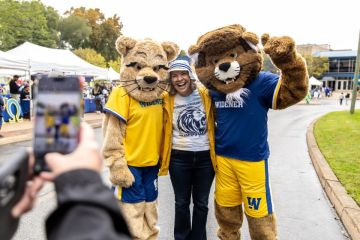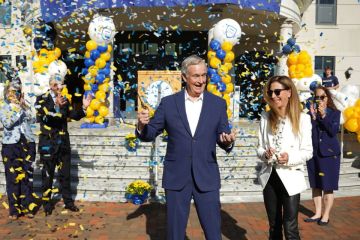Advancing a Culture of Diversity, Equity, and Inclusion

In the last two centuries, the institution we know of as Widener has undergone enormous change, evolving from an all-boys school and then military college to a comprehensive, agile university educating 21st century learners.
Today’s campuses are more diverse and inclusive places, featuring rich tapestries of different races, ethnicities, abilities, religions, socioeconomic backgrounds, gender and gender identities, worldviews, and life experiences.
The Widener of today is not the Widener of yesterday.
Advancing a culture of diversity, equity, and inclusion (DE&I) is a top priority for the institution, explicitly stated in the leadership team’s strategic goals. Significant strides have been made, especially in recent years. The equity gap in retention has been reduced, as has the graduation rate gap.
But there’s still much work to do to foster and sustain a place that students, faculty, and staff not only call home but also feel at home – a place where the university’s ethos of “We’re All Widener” is fully realized.
In short, it’s a perpetual work-in-progress, and Widener is committed to the journey.
Across Main Campus, Delaware Law, and Commonwealth Law, faculty, staff, and students are having difficult conversations, developing plans, and taking action to propel the university forward.
Widener is evolving its approach to student recruitment and hiring practices to attract a more diverse community of people. The university is expanding professional development, training, and campus-wide discussions about systemic racism, implicit bias, microaggressions, and other salient matters.
Faculty are reexamining the curriculum and their teaching practices to further promote inclusivity within their classrooms and to better prepare students to live, work, and thrive in an increasingly diverse world.
Explore More: Reexamining the Curriculum to Be More Diverse, Equitable, and Inclusive
Newly formed or relaunched committees are bringing more voices to the table. And student groups have taken up the call, driving education and action on their fronts.
We’re breaking the ground so we can build a strong foundation, and there’s action behind that. Are we there yet? Absolutely not. Do we have lessons to learn? Absolutely. We are taking an honest look at ourselves, reflecting on our past, looking at where we are and where we need to go. — Chief Diversity Officer Micki Davis
This work has been ongoing, but the events beginning in spring 2020 – the killings of George Floyd, Breonna Taylor, and other Black individuals, and the proliferation of Black Lives Matter protests – have accelerated some initiatives. In this moment of national reckoning, Widener is coming together like never before for difficult but necessary dialogue.
“Discomfort,” said Davis, “is a place for growth.”
Building a more diverse, equitable, and inclusive community takes the will and work of everyone, from senior leadership, to faculty and staff, to students.
Social Work Clinical Assistant Professor Richard Cooper, whose scholarship focuses on Black history, race, and social justice, says the key is to move beyond words and platitudes to enact real institutional change. He has seen improvements in his time at Widener but says there “has to be a systematic examination of all of the components, from top to bottom – the Board of Trustees to students – and from side to side. Things this big, we can’t take them on all at once. Change has to be steady.”
Institutional Change
Widener’s executive team has made advancing a culture of DE&I a multi-year goal interwoven with the university’s core strategy of fostering an agile institution that effectively responds to change. This means responding to changing demographics and the changing needs and desires of current and future students and the world they’re entering.
Being able to shift procedures, processes, assumptions – it’s all about agility when you recognize they’re not working or they’re not inclusive. And if they’re not inclusive, they’re not working. That’s built into our strategy. — President Julie E. Wollman
One area this is playing out is in student recruitment. Widener is focusing on ways to more intentionally recruit from underrepresented communities. That means looking at where structural racism exists within the admissions process, not just at Widener, but across higher education.
In the past, for instance, Widener distributed financial aid based, in part, on the strength of a student’s high school. This created an inherent disadvantage for students who attended poorer performing schools, even if the individual student excelled academically. This practice is being abandoned.
In addition, the Board of Trustees, led by a committed Chair, is looking at the makeup of the board and advocating for greater diversification.
Reflecting the commitment to DE&I, Chief Diversity Officer Davis is a member of the executive team, bringing her voice to top-level decision making. Davis’s approach to DE&I is a holistic one that considers all types of differences, far beyond the usual boxes.
“The spirit of inclusivity takes into account the whole community, including online and in-person students, non-traditional and traditional, commuter and residential, undergrad and grad,” said Davis.
A number of committees and task forces are providing the infrastructure for these efforts, including the recently reorganized Diversity Leadership and Inclusion Council, which now includes greater representation from the three campuses, as well as undergraduate and graduate student members.
That is a great start. It makes me feel good that Widener is not just in it for the moment, but making moves, putting plans in place. — Xavier Ross ’22, president of the Black Student Union
A new standing DE&I committee of Faculty Council has set, among other goals, the charge of supporting the hiring, retention, and promotion of a diverse faculty and staff; advocating for the recruitment, retention, and graduation of students from diverse backgrounds and experiences; and helping colleagues adopt more inclusive learning practices in the classroom.
“This new committee,” said Provost Andy Workman, “demonstrates the commitment of the faculty to taking on the deep challenges of building a more diverse and inclusive university. Because they are central to the university’s mission, it is essential that the faculty take on this responsibility if there is to be real change, and I look forward to working in partnership with them to make rapid progress toward this end.”
The LGBTQ Task Force has driven, and continues to influence, a number of changes on campus, including expanding the number of all-gender bathrooms, implementing an affirming name policy, increasing housing options to be more gender-inclusive, and expanding Safe Space Training to include a hybrid, more accessible format. The Safe Space program offers numerous safe places on campus for students to come if they’re experiencing any difficulties concerning bullying or harassment, the coming out process, gender identity, or related issues. These are judgment-free zones where trained allies will listen, assist students in working through an issue, and offer additional resources as needed.
At Delaware Law, a new student task force is working with faculty and alumni to launch a strategic DE&I plan. Among the initiatives being discussed is a formal process to report discrimination, as well as an expansion of implicit bias training for students and staff.
“The school has really opened the line of communication with Zoom calls once a week with the dean,” said task force member Jocelyn Mendez, a third-year student and president of the Black Law Students Association (BLSA) and vice president of the Latin American Law Students Association (LALSA).
Added Mendez: “Students, and myself included, we got to the point where we made it clear we needed more. It’s both an outgrowth of what happened this spring (nationally), and an outcry from students and alumni. And people are willing to have these tougher conversations.”
Similar conversations between students and administrators are occurring at Commonwealth Law, with its BLSA chapter calling for the school to expand training and education, more diverse hiring, and more scholarships to attract diverse students.
“The school has been so receptive to concerns,” said Asia Bolton, a second-year law student and president of Commonwealth’s BLSA chapter. “This is not a one-and-done thing. Keeping the conversation alive is the most important thing we can do as a school.”
Representation and Support
Fostering a diverse and inclusive community is about more than just increasing numbers. But numbers matter because representation matters.
Biology major Jayden Durham ’21 is often the only Black person in her classes. She believes Widener needs to improve its outreach to more diverse communities in the recruitment process.
Beyond her peers, Durham also feels the diversity deficit among the faculty. “There are no professors that look like me,” said Durham.
Diversity of faculty and staff across the three campuses has long been a challenge and is not a quick fix. But the university is committed to making changes that will move the needle, including implementing implicit bias awareness training for all hiring committees. There is also a greater focus on employee orientation practices to ensure new hires better understand Widener’s commitment to DE&I.
“It’s not merely about increasing numbers. It’s about looking at ways to improve the climate to make it more hospitable, so people want to stay,” said Legal Methods Professor Iva Johnson Ferrell, who also serves as co-director of the Trial Admissions Program at Delaware Law.
A couple of professors who are people of color recently joined Delaware Law, and students view it as a significant step.
“The new hires show that the school is really trying to make those strides,” said Mendez.
BIPOC (Black, Indigenous, and people of color) students across Widener’s campuses describe the nationwide events of the last few months as exhausting; some equate it to experiencing recurring trauma and cyclical grieving.
But students also say they have felt real support from the university community.
Physical therapy doctoral student Elliot Mason is new to Widener and already has experienced this support system. Seeing professors participate in campus-wide diversity conversations and having professors reach out to ask if he’s okay have meant a lot.
“That’s big. It says you care, and it’s appreciated,” said Mason.
When a passing motorist shouted a racial slur at Adiah McKnight ’21 as she walked on campus, she was shaken to her core. “I had never encountered blatant racism before,” said McKnight. “I don’t know if the driver was a Widener student, but it definitely hurt me.”
McKnight found help from a Widener staff member and the Counseling and Psychological Services office.
“I do feel supported here,” she said.
Nyima Sagnia ’23 is part of the Muslim community on campus. The accounting and finance major wears a hijab and adheres to other traditional practices, including eating halal. When she first arrived on campus as a freshman, she discovered there wasn’t much she could eat in the dining hall.
“I kept the problem to myself,” said Sagnia, who drove back and forth between campus and her home to pick up food.
In her sophomore year, Sagnia decided to speak out. She recently met with President Wollman and Linda Gilbert, associate vice president of administration and finance, to address the food issue. Widener Dining is now looking at ways to enact immediate changes, as well as long-term solutions that can be expanded on in the future.
“We talked about ways to help accommodate Muslims on campus and partner with [Widener Dining],” said Sagnia. She recently became a tour guide so that she could show other prospective Muslim students that Widener is a welcoming place.
Dialogue, Programs, and Training
From large town hall meetings to more intimate forums, the community is having honest conversations about DE&I and social justice issues at Widener and beyond. And Widener is well-equipped to hold these dialogues, having established the groundwork through DiversiTEA meetings and the Common Ground Initiative.
Introduced in 2019, DiversiTEAs are informal gatherings involving conversations to collect and share information regarding diversity initiatives and suggestions for enhancing DE&I on campus. This year, Widener has held DiversiTEAs on systemic racism, what individuals can do to bring about change, LGBTQ allyship, and the use of pronouns and why they matter.
Mason, a participant in recent DiversiTEAS, is encouraged that these gatherings are more than just talk and “seem really goal-oriented. We’re planting seeds for the future of campus with respect to DE&I.”
Launched in 2017, Common Ground discussions involve more intimate gatherings, designed to help the community navigate issues in an increasingly polarized world.
Programs addressing DE&I and systemic racism have certainly ramped up since the spring. In June, the Student Government Association (SGA) held Factuality: A 90 Minute Crash Course on Structural Inequality in America. Over the summer, the Main Campus community read the book White Fragility: Why It’s so Hard for White People to Talk about Racism.
In October, the Center for Social Work Education hosted events around antiracism and Black Lives Matter. And Widener held a campus-wide workshop on ways to make the university experience more accessible and inclusive for students with disabilities.
This fall, Widener is holding the 21-Day Racial Equity Habit Building Challenge, in which participants read articles, watch videos, and engage in small group discussions to practice habits and take action toward racial equity.
Delaware Law is holding a semester-long Dean’s Forum to address a number of topics related to DE&I, including implicit bias and microaggressions, COVID-19 and public health, and discrimination in property law.
Commonwealth Law is also offering professional development programming and workshops focusing on DE&I issues, including allyship. This training, said Eden Mandrell, assistant dean for career development, is an important element in readying future lawyers to tackle systems that are not always just, and to work with clients of all backgrounds and experiences.
“As future lawyers, our students are in a unique position to shape our community and to impact individual lives,” said Mandrell. “Not everyone is treated fairly under the law. Our students, as future lawyers, can help change that."
On Main Campus, the College of Health and Human Services (CH&HS) is holding a series of dialogues and trainings as well. Graduate students within the social work and human sexuality studies programs recently petitioned for changes to make their centers more inclusive.
These changes include calls for more faculty members who are Black and Indigenous; transforming content in the curriculum to better center BIPOC experiences; training for faculty on addressing racism in the classroom; and review and revision of policies to address disparities that negatively impact BIPOC students.
Leaders across CH&HS are meeting with students to address their concerns and look for ways to implement changes.
While students across Widener’s campuses say the training, programming, and other initiatives are positive developments, there are calls to do more, beginning with orientation for new students and onboarding for faculty and staff, and continuing training throughout an individual’s time at Widener.
Student Leadership
The nationwide killings of unarmed Black people and the rise in protests calling for reforms are also inspiring students to enact change within their campuses and their professions.
SGA made DE&I and combating systemic racism its platform this year. Through social media and programming, the organization is focused on educating students about everything from the history of racism in America to police brutality of today.
As a leader, I shouldn’t be sitting back. I took it as an opportunity to speak up as much as I can. We can’t change everything, but at least we can try. — SGA President Arianna McRae ’21
McRae, who is of West Indian heritage, is the first Black woman to serve as SGA president, and she is joined by an all-female executive board, the most diverse in SGA’s history. McRae hopes her election inspires other students of diverse backgrounds to run for leadership positions.
SGA is partnering with a number of student groups and campus leaders in their efforts. One example is the BSU and its president Xavier Ross. A junior finance major, Ross has set his sights on improving the relationship between Widener and Chester to help combat stigma surrounding the city.
“How can we create change on a grand scale? It starts within our own community,” said Ross. “Widener is Chester. We’re a part of the community.”
Commonwealth’s chapter of BLSA is committed to educating the community on ways to help combat systemic racism more broadly, including donating to organizations, voting, and checking on Black friends and family.
“George Floyd shook the world, but there’s so many others. It was a fire that lit folks up to understand. We need to continue that education,” said second-year law student Brittany Griffin, BLSA vice president. “This is the reason I’m in law, to hopefully be one seed to influence some type of policy.”
Education is also a goal of the newly restarted Muslim Student Association on Main Campus. Sagnia, its president, helped relaunch the group to bring her fellow Muslim students together and help teach classmates about their culture and religion, as well as combat misconceptions and stereotypes.
The Future
As Widener looks to its next 200 years, the university is committed to evolving and embracing new ideas and practices, including in the area of DE&I.
We need to be open, willing to listen and ask questions, and be willing to call each other out on things. — President Wollman
But what does “success” look like in the world of DE&I at Widener?
Some say success means Widener no longer needs to have these conversations; others say that implies there’s an endpoint, but human nature is not hardwired for such a utopian reality.
For Associate Dean Justin Sitron, who is leading the coordination of DE&I initiatives within CH&HS, success is “creating systems and processes in which these conversations can happen and be sustained. Success is having the skills to listen and dialogue, advance policy, and create resources to continually address marginalized communities and bring them to the center.”


